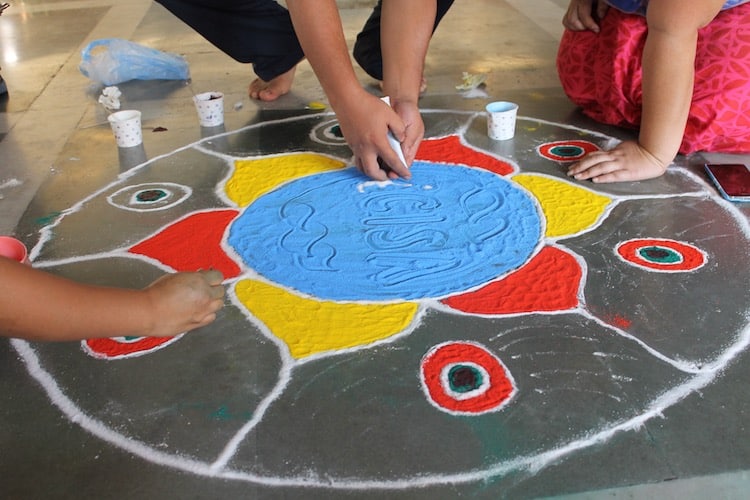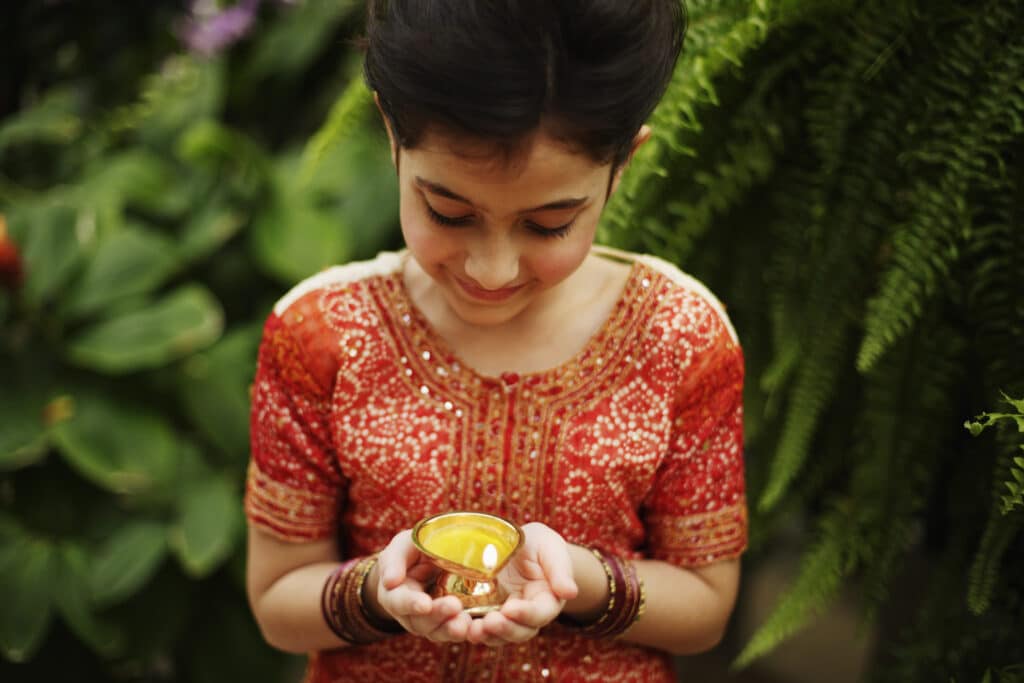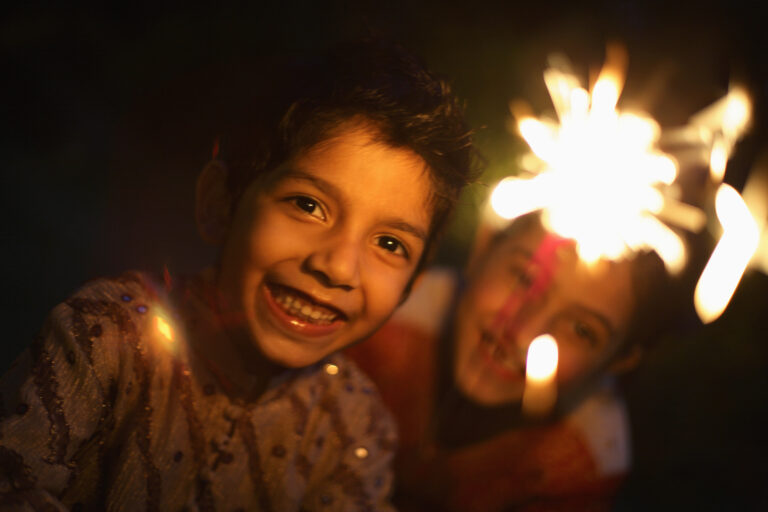Diwali, the festival of lights, is India’s biggest holiday for spiritual renewal, new beginnings, and community. In some parts of India, Diwali marks the beginning of the Hindu new year.
For millions living abroad, away from India and Southeast Asia, Diwali is still a big five-day celebration. Many of Indian descent, regardless of where they live, find that the festival of lights reinforces their cultural identity in addition to its key religious meanings.
At Remitly, we know that many of our customers have moved abroad for more opportunities to work to support family members and may be missing being with loved ones during the five-day festival. We also know that when you can’t be home for Diwali, there are still some great ways to keep its spirit alive.
Read on to learn how to celebrate Diwali anywhere in the world.

16 Ways to Celebrate Diwali from Afar
Sending money is a great way to commemorate this festival of community, along with remembering to send your well-wishes and blessings to those you love.
Here are a few other Diwali activities that can connect you to traditions back home.
Play Card Games
About a week before Diwali, friends and family often play cards, such as Teen Patti or Flush.
Playing cards brings a sense of togetherness and relates to the traditional elements of Diwali celebrations. Teen Patti is considered auspicious to play on Diwali itself, as it is believed to bring good fortune and money.
A big win will surely make for a Happy Diwali, but you don’t have to play for money. Consider awarding chips or tokens to winners. When you’re finished spending time together, everyone can exchange their tokens for small, inexpensive gifts.

Diwali Cleaning
Clean your home thoroughly for the first of the five days of the Diwali festival, Dhanteras. Create a plan of action to accomplish everything without any stress. Many families living abroad choose to clean together to kick off the festival of lights.
Put all bank accounts and papers in order, do all laundry, and make sure your home is tidy and clean in preparation for the celebration to come.
A thorough cleaning will provide mental clarity and peace and put you in the right mindset to move on to other celebration festivities.
Diwali Shopping
On the first day of Diwali celebrations, it’s customary to buy kitchen utensils, as well as jewelry and even larger purchases. You may also want to shop for new clothes for the celebration.
Whether you want to shop for clothes or gadgets, look for deals online to stock up on desired items for the year ahead. It’s also a great time to finish up buying Diwali gifts for loved ones.
Decorate with a Colorful Rangoli
On the second day of Diwali celebrations, many people decorate their homes and doorways with beautiful designs made with colored sand, flower petals, or other colorful materials to welcome the deities.
These decorations go by many names throughout North and South India. Here’s a look at the names from region to region:
- Andhra Pradesh: Muggu
- Bihar: Aripan
- Gujarat: Rangoli
- Karnataka: Rangoli
- Maharashtra: Rangoli
- Orissa: Jhoti or chita
- Rajasthan: Mandana
- Tamil Nadu: Kolam
- Uttarakhand: Aipan
- Uttar Pradesh: Chowkpurana
- West Bengal: Alpana
Rangoli designs are traditional and often passed down through families, but you can also create your own. Learn how to create your own Diwali rangoli designs.
Surround Yourself with Diwali Decorations
Decorating the home is a Diwali tradition that many families look forward to. On the first or second day of Diwali, setting out candles and lanterns with friends and family can be a great way to celebrate.
Traditional Diya clay lamps best signify the festival of lights. Many new varieties of diyas are on the market, and you can even buy and decorate them yourself with paint.
You can also make Diwali candles, clay lamps, and lanterns at home out of simple materials or even repurposed old materials from past celebrations. Feel free to use string lights for your decorating ideas. They can be a fun, simple way to illuminate your home for the festival.
Watch Films
During Diwali, plan to spend time with your family watching your favorite Indian films, and Bollywood movies are a great pick. Here are a few that you can stream during the festivities:
- Dilwale Dulhania Le Jayenge (1995)
- Hum Aapke Hain Koun (1994)
- Kabhi Khushi Kabhie Gha (2001)
- Jab We Met (2007)
- Lagaan: Once Upon a Time in India (2001)
- Mohabbatein (2000)
- Swades (2004)
- Taare Zameen Par (2007)
- Zindagi Na Milegi Dobara (2011)
You can also gather together to watch Diwali episodes of American TV shows like The Office and Outsourced.
Read Stories
If you have kids, reading stories about the holiday can help them understand the significance of the festivities and why Diwali is celebrated in India and abroad. Books can also introduce children to deities associated with Diwali, such as the goddess Lakshmi, Lord Krishna, and Lord Ganesha.
Some great children’s books about Diwali include:
- Amma, Tell Me About Diwali by Bhakti Mathur
- Archie Celebrates Diwali by Mitali Banerjee Ruths
- Baby’s First Diwali by DK
- Binny’s Diwali by Thrity Umrigar
- Diwali by Hannah Eliot
- The Diwali Gift by Shweta Chopra
- Diwali Lights by Rina Singh
- Diwali Rose by Vashanti Rahaman
- Diwali, The Festival of Lights by Nick Sharma
- Five Days of Diwali by Dev Vishwas
- Let’s Celebrate Diwali by Anjali Joshi
- Lights for Gita by Rachna Gimore
- Lots of Lights by Kavita Sahai
- Prince of Fire: The Story of Diwali by Jatinder Nath Verma
- Rama and the Demon King: An Ancient Tale from India by Jessica Souhami
- Shubh Diwali by Chitra Soundar
Listen to Music
When you visit with your loved ones during Diwali, set a joyful mood with music. Create your own Diwali playlist or explore your favorite music streaming service to find playlists made by others. Spotify has several great options, including Diwali Party Hits and Bollywood Dance Music.
Treat Yourself to a Soak
Begin the second Diwali festival day by taking a holy bath. A long soak helps you relax and puts you in a contemplative state of mind while symbolizing new beginnings. After you bathe, you can put on your new clothes and be ready to celebrate.
Cook a Mountain of Food
On the fourth day of Diwali, some Hindus prepare a special feast in honor of Lord Krishna. They prepare dozens of dishes and assemble them into a mountain of delicious food in honor of the god.
This tradition also reflects Diwali’s origins, as many historians believe it was originally celebrated as a harvest festival and was a time to give thanks for nature’s bounty.
Send Special Wishes
Providing family and friends with Diwali greetings is customary to show your love and care for them.
Whether you do this in person or miles away by sending money to India from afar, sending loved ones Diwali wishes is a special part of the celebration.
Celebrate with Traditional Sweets
Making and eating Diwali sweets is a wonderful way to celebrate and feel connected to home.
Sweet and savory snacks such as pongal (rice and nuts), burfi (milk cake), kulfi (ice cream), rasgullas (balls of dough), and jalebi (deep-fried dessert) can all be prepared at home.
Check Out Local Events
Virtual and in-person Diwali festivals and events abound in major metropolitan areas across the United States, Canada, and the UK, such as New York, Houston, Vancouver, BC, the Bay Area, and London, to name a few.
Throw Your Own Party on Lakshmi Puja
Plan a party for Lakshmi Puja, the main day of Diwali, which falls on the third day of the festivities and is dedicated to the goddess Lakshmi. Light your clay lamps or lanterns to set the mood and serve your favorite sweets and foods. Your party can also be a great time to exchange gifts with your loved ones.
When putting together your guest list, feel free to include people who aren’t Hindus. Sharing the traditions of Diwali with those who don’t worship the goddess Lakshmi and the other deities connected to the festival of lights can be a wonderful way to help others learn about Indian culture.
Watch Fireworks
Here’s another way to bring more of a glow to your celebrations of the festival of lights: fireworks! Check to see if any local groups are organizing displays in your area.
If you can’t find any public displays, light sparklers or firecrackers at home. Just be sure to be careful so everyone has a safe holiday.
Attend the India Heritage Festival
If you’re in the Washington, D.C., metro area or feel like taking a trip for Diwali, make plans to attend the India Heritage Festival. Held every year in October or November to coincide with Diwali, this event features shopping, food, music, and activities for children.
Learn more about the Indian Heritage Festival and plan your visit.
How are You Celebrating Diwali This Year?
Do you celebrate the holiday by sending money home to friends and family? Will you attend a virtual event or prepare a special dish at home? What gifts will you be exchanging with those you love during the holiday? Will you make a special art creation?
Let us know how you celebrate Diwali from afar this year.
Learn About More Indian Traditions
- 9 Fascinating Fall Traditions from Around the World
- What is Diwali, the Festival of Lights?
- Christmas in India: A Guide to Celebrations on the Subcontinent and Abroad
- August 15th marks India’s Independence Day
Frequently Asked Questions
While primarily a Hindu festival, Diwali, also known as Deepavali (a sanskrit word meaning “row of lights”), is one of the most significant festivals in the Indian diaspora and symbolizes the victory of light over darkness. People in India decorate their homes with rangoli designs, lights, paper lanterns, and diyas (oil lamps). Many families also prepare traditional Indian delicacies, exchange gifts, pray, and light and view fireworks displays. In Northern India, the cities are adorned with colorful decorations. Many Muslims in India also partake in the festivities.
In Hinduism culture, Diwali commemorates the return of Lord Rama to Ayodhya and the reunion with his wife, Sitaafter, after defeating the demon king Ravana, symbolizing the victory of good over evil. Jainism offers another layer of significance. For Jains, Diwali marks the moment when Lord Mahavira attained nirvana. In Buddhism, Diwali is a time to reflect on the teachings of the Buddha, and for Sikhs, the holiday is meant to honor Guru Hargobind. Another Diwali story is the tale of the demon king Narakasura, who is defeated by Lord Krishna.
If you’re not in India during Diwali, you can still celebrate at home. Decorate your home with lights, diyas, and rangoli, and clean your home to welcome the goddess of wealth, Lakshmi, who brings good luck in the coming New Year. You can cook traditional Indian sweets, attend a Diwali celebration, play card games, watch films, read stories, and exchange gifts with loved ones.
